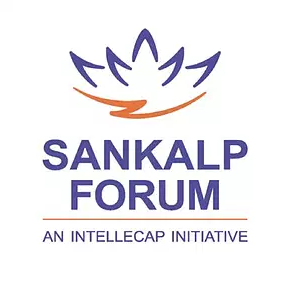Circular Apparel Innovation Factory (CAIF) and its partners Aditya Birla Fashion and retail (ABFRL) and The DOEN Foundation convened 250+ industry leaders, practitioners and innovators at first CAIF Conclave as part of this year’s Sankalp Forum. Stefanie Bauer-Vemuri, Director of CAIF, reflects why this is path breaking.
3rd December, 2019, Mumbai: It is rare that you walk away from a conference or industry convening with a deeply satisfying feeling of “WOW, today something magical happened”. Whoever attended last week’s 11th Sankalp Summit in Renaissance Hotel in Mumbai and the first Conclave that Circular Apparel Innovation Factory (CAIF) hosted with our partners ABFRL and The DOEN Foundation may agree that this was not your typical industry event. Among the 1300 guests that participated in Sankalp Forum, 250+ industry pioneers, circular fashion startups and innovators, brands, and designers, researchers and academicians, ecosystem players and investors convened with the intent to align behind a common vision for change towards a circular textile and apparel industry in India, showcase the innovative solutions they work on, and build the foundation for collaboration.
Creating a shared view on the need for change
The urgency for this convening is evident looking at the state of the sector: Given India’s position as a leading manufacturing and emerging consumption hub globally, the question of sustainability looms large on the sector. The Indian textile and apparel sector is one of the most polluting, with a negative footprint not only on workers but whole communities. Globally, the production of textiles results in the creation of 1.2 billion tonnes of greenhouse gases each year; the industry is the world’s second largest polluter, and estimates indicate its contribution to global climate change is peaking at 8.1%. Indian textile industry is a major contributor to waste and pollution with nearly 5% of all landfill space being taken up by textile waste and 20% of all fresh water pollution being made by textile treatment and dyeing plants. In the last 15 years, clothing production has doubled; if this trend continues, there is an expected US$ of 52 bn of profit reduction for the industry forecasted by 2030. While globally brands and retailers have started to make commitments towards sustainability and a new textile economy that creates less waste, environmental damage and negative social impacts, industry action has so far been limited in India.
Building the foundation for new levels of industry-wide collaboration
With Circular Apparel Innovation Factory India has its first home-grown industry platform, aiming to build the capabilities and ecosystem needed for a transition towards a circular textile and apparel industry. The initiative was seeded in 2018 by Intellecap, The DOEN Foundation, and Aditya Birla Fashion and Retail, and has been officially launched at the first CAIF Conclave on 27th of November 2019, with more than 60 industry and ecosystem players supporting its agenda and vision. The industry needs new levels of collaboration: As Naresh Tyagi, Chief Sustainability Officer of ABFRL and Chairman of the Governance Council of CAIF, highlighted in his Opening Address, India needs a holistic and system-level approach to drive a circular economy in the textile sector on the ground, and for this we need the industry to come together. While ABFRL has been the first corporate partner to come on board to support the initiative, Ashish Dikshit, Managing Director of ABFRL, invited the industry to join the platform: “What we are witnessing — and all of you are co-creators, not just participants — is probably the beginning of the most transformational change that the Indian textile and apparel industry is experiencing over the next few years. So while you go through and enjoy the interactions and contribute to the process, you must be mindful and thoughtful of the fact that what you are going through is probably going to decide our journey as the industry moves forward. While we have taken the lead in supporting CAIF, the idea is to invite others from the industry to join. CAIF needs to be a forum for players across the value chain, the industry, universities, entrepreneurs. The purpose of this platform is to collaborate, to innovate, and make a difference to create a path that we look look forward to.This really belongs to all of you.”
Making India the hotbed of action towards a circular textile economy
While one of the key roles of CAIF is to convene the industry behind a common agenda, a key objective is to drive action on the ground and act as a facilitator of implementation. To illustrate how new types of partnerships can drive action on the ground, industry pioneers presented their approach to solving some of the industry’s big challenges through innovative ‘unusual alliances’:
1. Manohar Samuel, President of Birla Cellulose, shared the company’s approach to engaging with innovative startups in areas such as textile to textile recycling and post-consumer waste such as Renewcell, Infinited Fibres, Evrnu, Orange, Saxcell, Nanallose, or Agraloop, in addition to the company’s in-house R&D and supporting platform and market-building solutions such as traceability innovations.
2. Deepan Kannan, Innovation Manager at H&M, shared H&M’s approach to innovation in line with the sustainability vision of 100% recycled or sustainably sourced material by 2030. One of the most current efforts is a research project in partnership with DEMETO/GR3N and supported by the EUn the field of polyester recycling.
3. Padmakar Pandey, Aditya Birla Fashion and Retail and Sarvanan Parisuthan Co-Founder of tech startup Trustrace shared a recent collaboration to test how a blockchain-enabled data management system can support transparency and traceability in the Indian supply chain beyond the tier 1.
4. Gautam Vazirani of IMG Reliance shared how Project SU.RE, a joint project by IMG Reliance and CMAI that has recently been launched by the Ministry of Textiles, has succeeded in getting 16 brands and retailers to commit to 5 important sustainability principles, building the foundation for voluntary action and industry collaboration.
Highlighting the bias towards action, the first CAIF Conclave witnessed the Launch of CAIF’s Open Innovation Challenge in partnership with ABFRL to crowd-source solutions to address the industry’s plastic packaging challenge: The BetterthanPlastic Challenge invites innovators, manufacturers and start-ups across the globe to propose alternate packaging solutions that are non-polluting and do not end up as waste in the landfill. By “proposing alternate solutions” we mean new materials, systems, business models and anything else you may think of, as long as it can be proven to be scalable and taken to market in the coming year.
Action was the key word of the first CAIF Conclave:
Following the Opening Session that created the common vision and showcased current efforts by industry pioneers was a Innovator showcase that CAIF hosted in collaboration with Fashion for Good, showcasing 5 innovative startups across the value chain. A Co-Creation Workshop showcased some of India’s most innovative inclusive circular business models and the winners of CAIF’s first innovation Challenge ‘Humans of Circularity’, and facilitated the process of creating new systemic solutions that can drive social impact at scale. In a Reverse Pitch Session, academic institutions pitched their most cutting edge work and showcased the innovations in the pipeline. During an interactive ecosystem mapping session, industry practitioners shared their current efforts with regard to circularity in textiles and apparel, and articulated their ask to a CAIF as a platform. A highlight of the CAIF Conclave marked the closing ceremony and Circular Fashion Show, which showcased the work of 6 circular brands and designers.
It is these efforts, that show that the Indian industry is in the middle of a reinvention and a move towards collective action. As CAIF, we are committed to support the industry to form more such powerful alliances like the ones showcased at the event, and drive change on the ground.
What can we look forward to in 2020?
With the official Launch of CAIF during the CAIF Conclave, the planning of the 2020 activity roadmap has started: The industry can look forward to a range of activities that are bringing the ecosystem together to innovative, collaborate, and drive change in the Indian textile and apparel industry. As Punit Lalbhai, Executive Director of Arvind Ltd, who is also one of the Advisory Committee members to CAIF, called out to the audience that the question for all of us is how India can be a beacon for bringing circularity to life. His hope is that CAIF can become a forum “where we can work together to bring projects to life, and test more hypotheses through distributed risk.” In the pipeline for 2020 are CAIF activities and collaboration projects in the area of innovative circular business and retail models, textile to textile recycling, and packaging. And of course, CAIF’s community is looking forward to the 2nd edition of CAIF Conclave in 2020.




